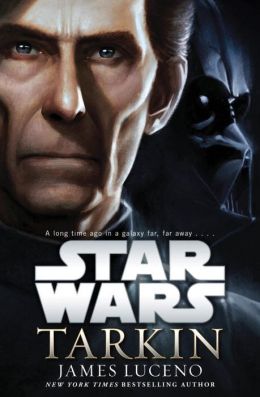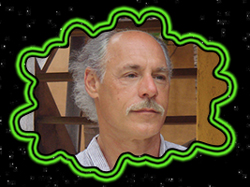Welcome back to The Pop Quiz at the End of the Universe, a recurring series here on Tor.com featuring some of our favorite science fiction and fantasy authors, artists, and others!
Today we’re joined by James Luceno, bestselling author of a number of Star Wars novels, including Darth Plagueis, Millennium Falcon, Dark Lord: The Rise of Darth Vader, Cloak of Deception, and Labyrinth of Evil, as well as The Visual Dictionary of Star Wars. His latest Star Wars novel, Tarkin, follows the dedicated soldier and distinguished legislator through the early days of the Empire—available now from Del Rey!
Join us!
Please relate one fact about yourself that has never appeared anywhere else in print or on the Internet.
There are aspects of writing that require you to image yourself in various roles and guises, to stand in the shoes of others, to act on an inner stage. In high school, years after outgrowing my imitation-coonskin Davy Crockett cap, a movie called Dr. No—the first of the James Bond franchise—prompted me to trade in my young-hoodlum-in training West Side Story-inspired sharp-toed boots and cuffed blue jeans for the tailored pants and polished shoes I thought appropriate for a budding espionage agent. Breaking a cardinal rule of spy craft, I actually let it be known that I wanted to work for the CIA. And for about a year and a half I learned all I could about Walther PPKs, shaken cocktails, and exotic cities like Istanbul and Port-au-Prince. But all that study went right out the window in February of 1964 when the Beatles appeared for the first time on the Ed Sullivan Show. The morning following their debut I went to school with my previously slicked back hair combed forward and just over my ears in a rather pathetic attempt to mimic the Beatles’ moptop haircuts. Having sworn allegiance to a new tribe, however, my artistic journey began.
opens in a new window You wake up tomorrow morning as the antagonist in your book: what do you do to change the ending for yourself?
You wake up tomorrow morning as the antagonist in your book: what do you do to change the ending for yourself?
In my most recent Star Wars novel, Tarkin, the titular character—antagonist and protagonist rolled into one—does not die, but fans of the franchise will recall that he does meet a grisly end aboard the Death Star in the movie A New Hope. On waking as Tarkin, I would gather the engineers who had worked on building the moonlet-sized battle station and instruct them to devise a way to retrofit the thermal exhaust port with a proper proton torpedo shield. Then I would single out the scientists who had designed the original exhaust port, as well as those Imperial accountants whose cost-cutting budgets were surely responsible for it having been left vulnerable, and jettison the lot of them into deep space.
What is your favorite short story?
While my favorite book of short stories is Fredrick Brown’s Nightmares and Geezenstacks, my favorite single story is “Sound of Thunder,” by Ray Bradbury. Set in the future it involves a time traveler named Eckels, who goes into the past to join a safari hunt for a Tyrannosaurus Rex. Eckels is warned by the group’s guides to watch what he does—literally to watch his step—as even simple changes in the past could have disastrous consequences in the future. Regardless, frightened by the sight of the dinosaur he has come to kill, Eckels leaves the safe, levitating path the group has been following and in the process inadvertently crushes a butterfly. When the group returns to the future—their present—they find their world has essentially been turned upside down.
I was probably twelve or thirteen when I read the story, and it had a profound effect on me. I began to think hard about the potential consequences of my own actions, and about the concept of chance. More important, my appetite for reading took me from Bradbury to Brown to Phillip K. Dick, and I never looked back.
Describe your favorite place to write.
Fifteen years ago, my wife and I purchased an authentic log cabin in Maryland. Painstakingly restored since, the cabin sits on a forested bluff high above a wide river frequented by ospreys, eagles, geese, herons, and other water fowl. I write at an old desk that overlooks the river, and take nourishment from the view rather than be distracted by it. However, my favorite place to write offers a vista of different waters. It’s from a table on the rear patio of a small inn on Lake Peten Itza, in northeastern Guatemala. The lingering presence of the ancient Maya is ubiquitous, travelers of all nationalities come and go, and the sun sets blazing into the vast tropical forest. At that table I’ve outlined and written large chunks of almost all my recent novels.
Name your favorite monster from fiction, film, TV, or any other pop culture source.
I was probably eleven when I began to add copies of Famous Monsters of Filmland to my collection of Classics Illustrated, Action Comics, and Mad Magazine. My favorite monster then and now is Frankenstein, specifically as embodied by Boris Karloff—billed only as “?” in the opening credits—in the James Whale-directed 1931 version of the tale. That’s not to say that there isn’t terrific stuff in the sequels, in films like Son of Frankenstein, Ghost of Frankenstein, Frankenstein Meets the Wolfman, even Abbott and Costello Meet Frankenstein. But there was just something about Karloff’s portrayal of the brooding, misunderstood resurrected creature that made me an instant fan. Only King Kong comes close in being able to elicit the same blend of dread and compassion. Doomed beasts, brought down by mad science and, in the case of Kong, by “beauty.”










